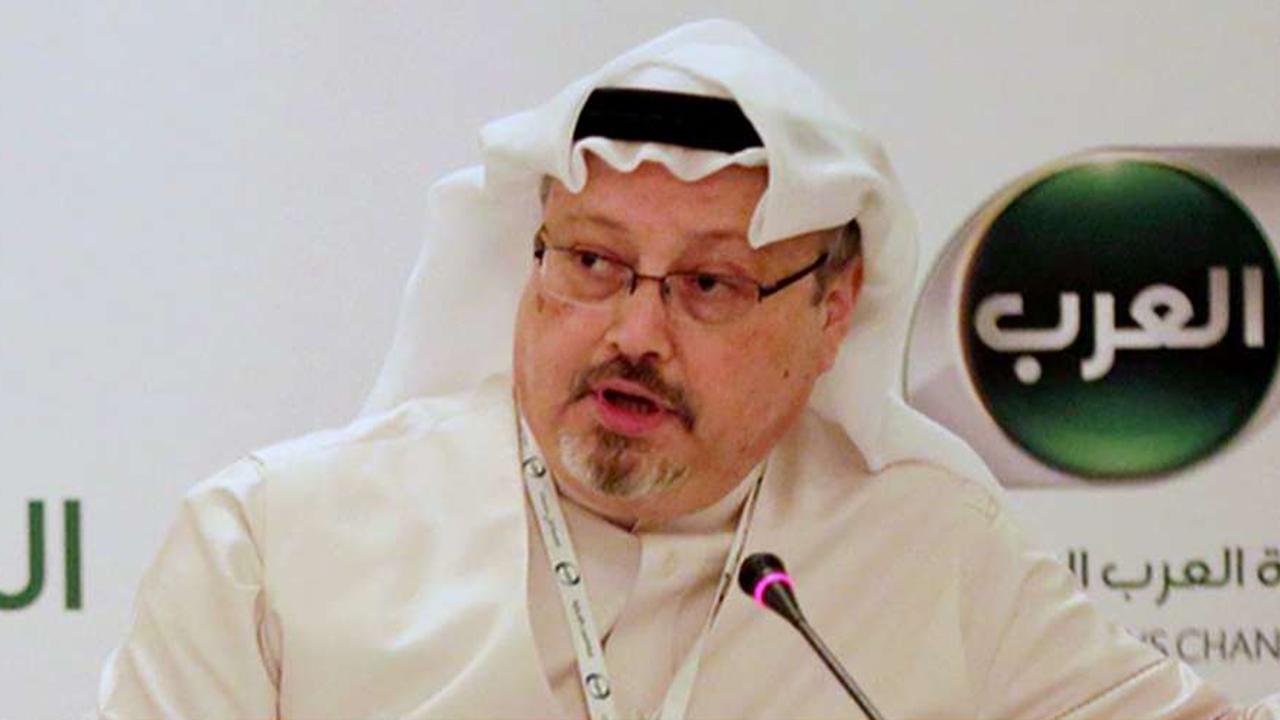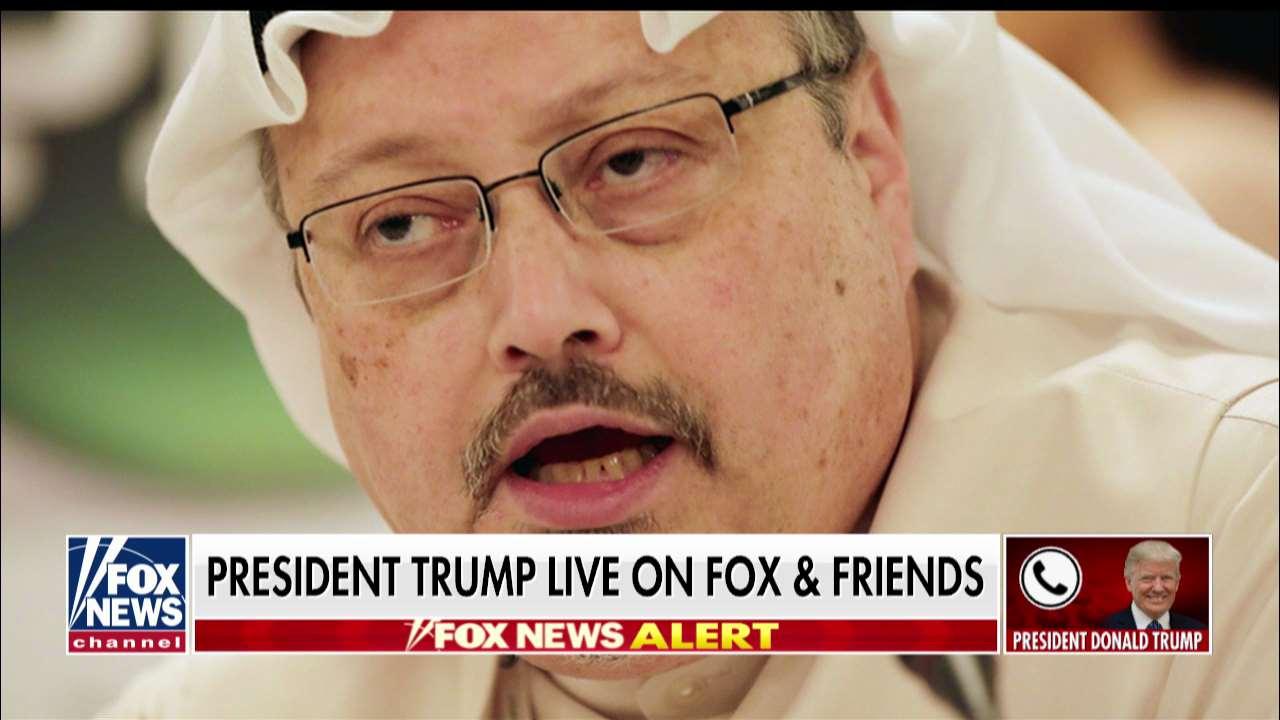Trump warns of ‘severe punishment’ if Saudi Arabia behind writer’s disappearance
Report: Recordings prove killing of Jamal Khashoggi
Turkish officials reportedly have recordings proving Saudi columnist was killed. Rich Edson has more from the State Department.
President Trump has warned that there will be “severe punishment” if Saudi Arabia is found to be responsible for the disappearance of a columnist inside a Saudi consulate -- as some in Congress call for the U.S. to sanction those responsible.
“We’re going to get to the bottom of it and there will be severe punishment,” Trump said in an interview with CBS News to be aired Sunday.
Jamal Khashoggi, who wrote columns in the Washington Post critical of the Saudi government, entered the Saudi consulate in Istanbul October 2 and disappeared. Trump said the U.S. would be “very upset and angry” if the Saudi government was behind it, adding that the Saudis had denied it “every way you can imagine.”
KHASHOGGI'S APPLE WATCH MAY HAVE RECORDED EVIDENCE, TURKISH MEDIA REPORTS
Senior members of Congress are pushing to cancel arms sales and sanction those found responsible.
Several Republicans and Democrats on the Foreign Relations Committee sent a letter to President Trump requesting he “make a determination on the imposition of sanctions … with respect to any foreign person responsible for such a violation related to Mr. Khashoggi.” The letter triggered an investigation under the Global Magnitsky Human Rights Accountability Act. That requires the administration to sanction those found responsible of a gross violation of human rights against someone exercising freedom of expression.
The State Department called the bipartisan effort premature.
“We don’t know the facts of this case just yet. So I think they’re getting ahead of themselves at this point,” said Heather Nauert, the State Department’s spokesperson. “We will watch the situation very carefully, very closely, wait for the facts to come out, and then we’ll get there.”
The president’s son-in-law and senior advisor, Jared Kushner, has a relationship with Saudi Crown Prince Mohammed bin Salman, the heir to the Saudi throne. President Trump chose Saudi Arabia as his first foreign destination as president.
TURKEY SAYS IT HAS VIDEO, AUDIO OF MISSING ACTIVIST'S MURDER AT SAUDI CONSULATE, REPORT SAYS
The president said the U.S. is looking “very seriously” at Khashoggi’s disappearance and that “it’s a terrible, terrible precedent. We can’t let it happen and we’re being very tough.” The president also called U.S.-Saudi relations “excellent” and noted that “it’s not our country. It’s in Turkey, and it’s not a citizen, as I understand it.”
The president has also rejected canceling Saudi military contracts.
“I will tell you, upfront, right now, and I’ll say it in front of senators: They’re spending $110 billion purchasing military equipment and other things. If we don’t sell it to them, they’ll say, ‘Well, thank you very much. We’ll buy it from Russia.’ Or ‘Thank you very much. We’ll buy it from China,’” he said. “That doesn’t help us — not when it comes to jobs and not when it comes to our companies losing out on that work.”
Trump echoed that sentiment in the interview with CBS News.
"I'll tell you what I don't want to do," he said, "Boeing, Lockheed, Raytheon. I don't want to hurt jobs. I don't want to lose an order like that. And you know what, there are other ways of punishing."
Dr. Paul Salem, the acting president of the Middle East Institute, said President Trump may attempt to secure concessions from Saudi Arabia on oil prices or weapons purchases.
“While the president might be ready to move on, after wringing a few concessions, the U.S. Senate has taken a stronger stance,” said Salem. “There is now a majority in the upper chamber that will block decisions favorable to Saudi Arabia unless and until Riyadh comes clean on what happened and holds whoever is responsible to account.”
Many in Congress already objected to Saudi Arabia’s involvement in Yemen’s civil war. In June, the Senate narrowly passed a measure allowing arms sales to Saudi Arabia.
“Generally speaking, because of the way they deal with Congress, there’s a sense of entitlement, I hate to use the word but arrogance, that comes with dealing with them,” said Sen. Bob Corker, the chairman of the Foreign Relations Committee. “Part of that may be because they have an incredibly close relationship with the administration, but I don’t want to say that has emboldened them to do what they do but, you know it’s at an all-time low.”
“The high profile two-week visit that the Saudi Crown Prince made to various U.S. cities this past spring, and where he was generally received positively and at the highest public and corporate levels, is no longer conceivable,” said Salem. “The U.S.-Saudi relationship is going through its most acute crisis since 2001. The relationship will survive the crisis, given the complex web of interests, but this crisis will certainly leave its mark.”









